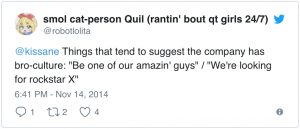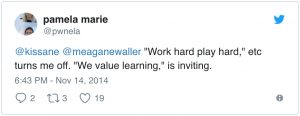If you’re a female developer who’s looked for a job, then you know two basic truths:
One, that as unicorns go, female developers are still far from a dime a dozen.
Two, that many tech companies still feel like an ongoing Pi Kappa Phi party.
And while some female devs are cool with that, others might prefer a more diverse and less testosterone-driven environment. As might some men too!
Well, worry no longer. We’ve researched and found 10 telltale signs that will reveal whether the “booming tech company” that approached you is, or isn’t, a great workplace for women (and men who hate tacos). Read on to discover how the company you’re considering stacks up.
1. Are there other female developers onboard?
If the company you’re considering has an all-male development team, you have to wonder why. Have other women started working there and quit? Or has the company never hired female developers?
A good way to gauge the gender ratio is by looking at their About Us and Careers pages. As one woman in tech said: “If [the career page] is plastered with pictures of white guys in flannel with beards, that’s a red flag.”
Being the first woman on the team can be a burden, as another developer explains: “You carry the responsibility of representing not only yourself but the entire experience of working with that semi-mythical creature, the female techie.”
2. Are there women on the management team?
A company with female leadership gets brownie points for a few reasons.
First, there’s less sexual harassment: Studies have shown that harassment flourishes in workplaces where men dominate the management.
Second, companies with women in senior management are more successful. “Fortune 500 companies with at least three female directors have seen their return on invested capital increase by at least 66%, return on sales increase by 42%, and return on equity increase by at least 53%.”
The fact is, gender issues are less likely to be an issue if there are women in power.
3. Do they use adjectives like “aggressive” and “dominant” in their job description?
Job descriptions speak volumes. What adjectives did they choose? Words like “hacker” and “ninja”, and phrases like “work hard play hard” and “looking for a rockstar”, tend to typify a male-centric atmosphere.
When surveying job descriptions, look for gender-neutral language. Ask yourself, does this company value soft skills in addition to hard skills? i.e. listening, group learning, collaboration, communication and the like. Our words reflect our biases, so job descriptions can be a great little tool to get insight into the company’s culture. Here are some examples from Twitter:


4. Do they value beer pong and long hours over health insurance and work-life balance?
The company culture is possibly the single most important factor when identifying a female-friendly environment. That doesn’t mean there shouldn’t be video games or Star Wars posters around the office.
But some companies take bro-culture to a whole new level: At Paypal, for example, young engineers would sometimes wrestle each other on the floor to solve disputes.
There is a fine line between “bro-gramming” and “pro-glamming”, and according to one female developer, that line is the culture. Another woman in tech sums up the difference perfectly:
“I don’t care that you have a ping-pong table, or a keg, or free snacks. I care that the CEO leaves on time to pick up her kids during the week, that the holidays are for spending time with your family, and that when the guy in marketing got engaged to his boyfriend everyone went out for lunch to celebrate.”
5. Is the salary a joke or is it high and transparent?
It’s depressing but true: Female programmers make up to 30% less than their male counterparts. You can tell a lot about a company by the salary they offer.
Make sure you’re educated on your market worth before you go into the interview. Also, pay attention to how they react during the salary negotiations–are they respectful, or condescending? Take this cautionary tale from a female engineer:
“I’ve told recruiters about my salary expectations and had them laugh and say “no one gives that kind of [salary/equity/vacation/benefits].” This has happened to me multiple times…It’s frustrating because…I’ve talked with other people in the industry and have concrete data proving that my salary expectations are reasonable.”
Some companies, like Buffer and Crowdfunder, go so far as to embrace salary transparency. Transparency has its pros and cons, but at least you’ll know you’re not being underpaid because of your gender.
6. They nurture and invest in them?
It’s a good sign if a company is actively invested in their employees.
How can you tell?
Check if they sponsor events, underwrite scholarships, hire interns and students, support Women in Tech events, offer mentoring programs, host trainings for young developers and returning workers, and the like.
Etsy is the poster child of such a company: In one year, they increased their female engineers by a whopping 500%, thanks in part to their “hacker grants” and summer Hacker School. One woman explains:
“Companies that have programs in place to encourage sponsorship of women are open to flexible work arrangements, and those that use quantifiable goals in performance reviews, not vague criteria, are less likely to be cultures that are unfriendly to females.”
7. Is the office littered with empty Dorito bags, joysticks and Red Bull cans?
A bro-oriented culture is one thing; a pigsty is another. The external appearance of an office reflects on their values and how organized and professional they are. When you go in for your interview, try to get a feel for the casual conversations.
Do they seem like a tight-knit team of sports fanatics, or subdued supernerds obsessed with sci fi, or wacky comic book collectors? Do the people seem genuinely cool, or like they’re trying too hard?
Do you feel like you would be comfortable and happy in this environment? One female developer offers pointers on the type of “brogrammer” you don’t want to work with:
“Being a good coder doesn’t mean you have to be a slob. Your wardrobe consists of more than witty T-shirts and hoodies…You don’t need to brag about how much you can drink nor your sexual conquests to prove you have a life outside of coding.”
8. Do they offer considerate benefits, like flexible hours and parental leave?
It’s a cold hard fact: women are more likely than men to take time off work for child rearing or caring for an elderly parent.
Any company that acknowledges this reality by offering flexible hours, part-time arrangements, and parental leave, is probably a great work environment for women.
Maybe you don’t care right now about having a “pump room,” on-site daycare, or even the extreme comped egg freezing, but one day you might — and these types of perks will tell you a lot about how much the company values its female employees.
If they put a lot of effort into luring you, they will probably put a lot of effort into keeping you happy.
9. Do they shoot rapid-fire, pop-quiz-style questions at you in your interview?
The way they talk to you says a lot. Is their tone of voice respectful or arrogant? Are they firing algorithms-focused questions at you for an hour, or do they encourage a discussion? Is the interview panel diverse? If there is no woman on the development team, do they bring in a woman from another team to talk about the culture?
The best kind of interview, according to one female engineer, “is when the interviewer asks you questions about a particular problem they’re actually working on… and we work through possible solutions collaboratively so I can get a sense of whether I would actually enjoy working with the person.”
Do they talk about how you’re going to grow in this role, and opportunities for advancement?
Try to get a feel for whether they use defined metrics for development and success, or if their assessment criteria is vague. Ambiguity is not your friend. Go for a company that makes the path to promotion crystal clear.
10. Do they have a reputation for being a great place to work — for all?
Street cred carries weight. Talk to people both inside and outside the company in private. If they have female employees, reach out to them: Are they satisfied working there? How long have they been with the company? Have they been promoted and received raises?
Also ask whether the company holds appreciation talks regularly. Given that women are statistically less inclined to ask for a raise than men, it’s important that the company takes the initiative.
Use other women’s experiences to your advantage. It’s no secret that “women gravitate to businesses that have expressed an interest in hiring and retaining women.”
If a company makes the effort to demonstrate why they are a great place in particular for a woman to work, they probably treat their female employees fairly.
Follow these 10 signs and you’ll be sure to identify a company that will make you feel at home. Because you deserve it, you unicorn! 😉
Are there any other signs we missed? Please share your thoughts in the comments below!



